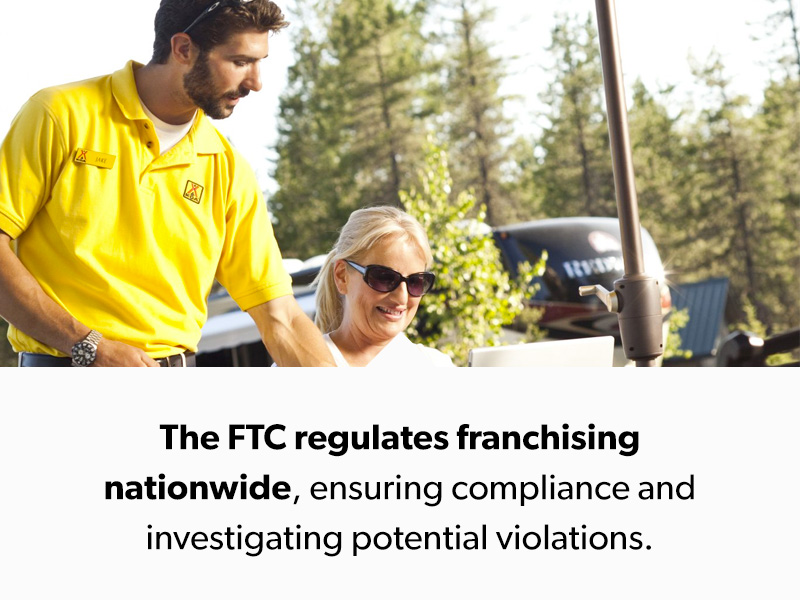
Franchise laws and regulations can be straightforward if you understand the basics. Although you may need a professional to explain the intricacies, there are fundamental things you should know, especially before you sign any agreement. As a potential franchisee, knowing your rights and obligations under federal and state laws and franchise agreements is best.
In this guide, we discuss the essential aspects of federal and state franchise laws, including the Federal Franchise Rule and franchise disclosure documents (FDDs). Kampgrounds of America (KOA) is committed to providing opportunities to help business owners achieve their goals. We share our resources and create a supportive environment to make each engagement worthwhile. Submit an information request to learn more about franchising with KOA.
What Is a Franchise?
A franchise authorization from a company to an individual or a business permitting them to carry out specified commercial activities. It’s a legal and business structure that allows authorized persons to provide products or services under specific branding and operational rules established by a parent company. The franchisee — the person licensed by the parent company — pays for the right to operate under the parent company’s brand and enjoys the benefits of a well-established entity.
Franchising has many benefits. However, before signing any franchise agreement, it’s crucial to understand what the terms mean and the protection you have under state and federal law.
What Are the Franchise Laws?
Franchise laws encompass federal and state laws regarding the offer and sale of franchises, registration and the legal relationship between franchisees and franchisors. In the United States, the Federal Franchise Rule, which the Federal Trade Commission (FTC) enforces, governs all franchise transactions.
The Federal Franchise Rule is the primary federal law regarding franchises, but there are state-specific laws and regulations, too. These laws, among other things:
- Regulate the relationship between parties in a franchise agreement.
- Provide the requirements for franchise disclosures.
- Detail the criteria for reviewing and registering FDD.
What Is the Franchise Rule?
The Federal Franchise Rule is the overarching federal law that sets the minimum standards for the franchisor’s disclosure obligations. However, states can adopt supplemental laws to govern franchises. The federal rule covers several areas, including:
- The franchisor’s obligation to furnish an FDD or pre-contractual disclosures.
- The franchisee’s general obligations.
- The content of a disclosure document, including the names and addresses of the parties, a general description of the competition and terms of the franchise agreement.
- Instructions for updating disclosures.
- Exemptions.
- Prohibited sales practices, such as contradicting the information provided in the FDD.
What Is a Franchise Disclosure Document?
The FDD is a comprehensive agreement providing information about the franchise, including the franchisor’s history, initial investment, ongoing royalties and fees, and related details. The franchisor needs to make the document available to the potential franchisee before the offer or sale of any franchise. The goal is to enable the franchisee to make an informed decision.
Federal law mandates franchisors to provide the FDD to potential franchisees at least 14 days before signing any agreement or advancing payment to the franchisor. Franchisees are encouraged to review the FDD within that period and seek professional advice before deciding. The Federal Franchise Rule specifies certain items that must be included in the FDD.
Federal Franchise Law

The principal federal legislation on franchising is 16 Code of Federal Regulations (CFR) Part 436, which provides for the disclosure requirements and franchising prohibitions. Under federal law, a licensing arrangement or business will be regulated as a franchise if it has three elements:
- An authorization from the franchisor to the franchisee to use the former’s trademarks.
- The franchisor’s ability to exert a significant degree of control or assistance over the franchisee’s method of operation.
- The franchisee’s obligation to pay a specified fee to the franchisor.
Regardless of how the parties describe their engagement, the agreement will be regarded as a franchise if the substance satisfies these conditions.
The FTC regulates franchising nationwide, ensuring compliance and investigating potential violations. Franchise agreements that don’t comply with these laws, such as engaging in deceptive practices or failing to provide disclosure documents, can attract legal sanctions. The FTC can impose penalties, take legal action and seek injunctions to restrain or compel certain activities.
State Franchise Laws
Some states have franchise laws and regulations to supplement federal legislation, covering areas such as:
- Offer and sale of franchises
- Prohibition of specific franchise agreement provisions
- Registration requirements
- Regulation of ongoing franchise relationships
- Additional FDD requirements
Generally, states can be categorized into three groups for franchise purposes.
The first group is franchise registration states, where franchisors must register their FDD before offering or selling franchises. Additionally, state law mandates franchisors to renew and update their FDD and other information annually. The registration states for franchisors that maintain federally registered trademarks include the following:
- Illinois
- Hawaii
- Indiana
- Virginia
- Michigan
- California
- Maryland
- New York
- Wisconsin
- Minnesota
- Washington
- Rhode Island
- North Dakota
Franchisors who do not maintain a federally registered trademark must also register the FDD and franchise offering with the following additional states:
- North Carolina
- South Carolina
- Connecticut
- Maine
The second group is the filing states, where the franchisor is not required to register their FDD, although the franchise must be filed with the state. For franchisors maintaining a federally registered trademark, the filing states are:
- Utah
- Texas
- Florida
- Kentucky
- Nebraska
- Connecticut
- South Dakota
- North Carolina
- South Carolina
While some states require a one-time filing, others require an annual filing. Franchisors not maintaining a federally registered trademark must file a notice in Louisiana and Georgia.
The final group is non-registration states, where franchisors are not required to register the FDD or submit a filing or notice. For franchisors maintaining a federally registered trademark, the non-registration states are:
- Ohio
- Iowa
- Idaho
- Maine
- Alaska
- Kansas
- Oregon
- Arizona
- Nevada
- Georgia
- Vermont
- Montana
- Alabama
- Missouri
- Arkansas
- Colorado
- Delaware
- Wyoming
- Louisiana
- Oklahoma
- Tennessee
- Mississippi
- New Jersey
- New Mexico
- West Virginia
- Pennsylvania
- Massachusetts
- New Hampshire
- District of Columbia
Frequently Asked Questions
Still have questions about franchises? Here are answers to some commonly asked questions:
Do Franchises Make Money?
Franchises can be financially beneficial to both franchisors and franchisees. Success depends on several factors, including the type of franchise and business model. Franchisees must research and conduct due diligence before signing any agreement. The ideal partner is one with similar goals, values and a proven track record.
How Do You Join a Franchise?
The steps to joining a franchise depend on the type of franchise and the franchisor’s requirements. However, it usually involves researching the ideal partner and going through an application and vetting process. If the franchisor accepts the application, the parties will discuss the terms and sign the contract. The franchisee will pay the franchise fee and undergo training. Then, the franchise will be established.
Join the KOA Family Today
Franchise protection laws enable business owners to reap the benefits of franchises. Yet, joining the right team is crucial. Joining KOA allows you to experience the complete package — advanced reservation software, a national marketing and branding powerhouse, and a best-in-class competitive advantage! To learn more, request franchise information today!
This publication is for general informational purposes only and should not be construed as legal advice. Please consult with a licensed attorney directly before taking any action or to seek further information.
